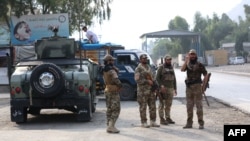Two Afghan insurgent groups, made up mainly of former government and military officials, claim to have killed at least 50 Taliban officials and soldiers during November.
The hit-and-run insurgency has been most active in the north and northeast of the country where the Taliban encountered significant resistance during their previous rule from 1996 to 2001.
In brief statements in Dari and English posted on X, the Afghanistan Freedom Front and the National Resistance Front of Afghanistan claimed their fighters regularly target members of the Taliban at checkpoints, military bases and even on highways.
So far, the Taliban have played down the armed insurgency, saying peace and tranquility have been fully restored throughout the country.
The Afghan media have suffered major setbacks under the Taliban regime, making it difficult to access accurate information and to verify claims made by the insurgent groups.
"At this stage, there is little reason to suppose that these insurgent groups pose a significant threat to overall Taliban rule," said Robert Grenier, former head of counterterrorism at the Central Intelligence Agency who also worked with anti-Taliban groups before 2001.
"As someone who was actively involved in trying to organize and motivate anti-Taliban groups and commanders — of which there were many — in the period just prior to 9/11, I can attest to the difficulty in organizing any sort of effective insurgency against Taliban rule. One of the reasons for this is the demonstrated brutality of the Taliban in dealing with perceived enemies," Grenier told VOA via email.
The United Nations and human rights groups accuse the Taliban of extrajudicial killings, detentions, torture and disappearances of individuals suspected of supporting anti-Taliban groups.
Since their inception in 1994, the Taliban have used brutal force to suppress armed opposition to their rule, but it is unclear how many insurgent fighters they have killed since reclaiming power more than two years ago.
The insurgents lack enough forces to topple the Taliban, at least in the near future, but they appear to be creating political and governance challenges for the Islamist regime.
Political havens
Fighting the Taliban has become a contentious issue among former Afghan officials even while political opposition to the Taliban's monopoly on power and their extremist policies has grown stronger.
Two former Afghan presidents, Ashraf Ghani and Hamid Karzai, who separately led Afghanistan in its post-Taliban years, have opposed the toppling of the Taliban through war, advocating instead for a political settlement that would create an inclusive government.
While the Taliban regime is globally ostracized and condemned for its misogynistic policies, no country has so far offered support for a war against the Taliban.
Despite fighting the Taliban for 20 years and imposing terrorism sanctions on their leaders, the United States has refrained from supporting anti-Taliban insurgents.
In October, the British government announced it was strongly discouraging groups and individuals seeking political change in Afghanistan through armed violence.
"Any effective insurgency against the Taliban would rely on foreign support and the availability of a safe haven outside the country," Grenier said, adding that the Taliban used safe havens in Pakistan for two decades while fighting Afghan and U.S. forces in Afghanistan.
While not supporting any warring party in Afghanistan, many countries have hosted the leaders of the anti-Taliban insurgent groups and other Afghan politicians who oppose the Taliban rule.
Recently, some former Afghan military officials who advocate for military and political campaigns against the Taliban opened the office of Afghanistan's United Front in the United States, raising the former Afghan flag on their office building.
"We need a little bit of help from your side," Sami Sadat, a former Afghan general and a leader of the United Front, told a U.S. House hearing last month. "We are ready to partner again, we are ready for the great sacrifice."
Taliban officials have publicly voiced frustration to countries hosting their opponents while most Taliban leaders are unable to travel because of United Nations sanctions.
Terrorism concerns
Islamic State Khorasan (IS-K), an affiliate of the Islamic State extremist group, reportedly poses the most potent threat to Taliban rule. In addition to targeting members of the Taliban, the group has perpetrated some of the deadliest attacks against religious minorities in Afghanistan.
"IS-K proved to be a resilient organization, attempting to plot attacks overseas and with bases of support in northern and eastern Afghanistan becoming more clandestine," Asfandyar Mir, an expert with the U.S. Institute of Peace, told VOA.
As the number of groups fighting the Taliban goes up, some experts warn about the possibility of yet another cycle of civil war in Afghanistan with potential terrorist threats to regional and global security.
Grenier, the former CIA official, said a resurgent IS-K in Afghanistan would pose greater security threats to regional governments than to the United States and its allies.
"We should remember that active IS operations in Western Europe were the result of active military operations by Western governments against them in Iraq and Syria, rather than on a desire to attack the West per se. Unlike al-Qa'ida, IS has always been far more focused on attacking regimes within the Islamic world, rather than on their perceived Western supporters," he said via email.
The United States government has evacuated and resettled thousands of members of the former Afghan forces, some of whom are seeking any kind of backing from the U.S. or its allies to intensify the war against the Taliban.
"Absent attacks on U.S. interests clearly emanating from Afghanistan, the U.S. will remain neutral," Grenier said.











